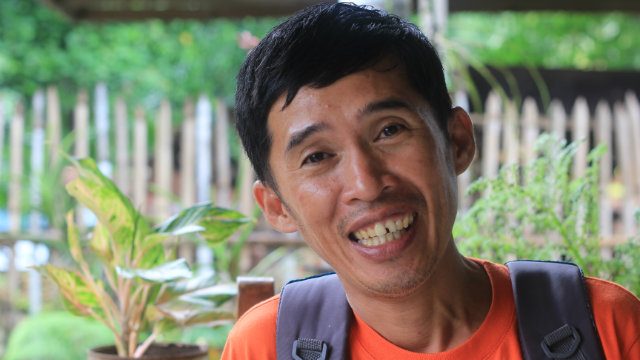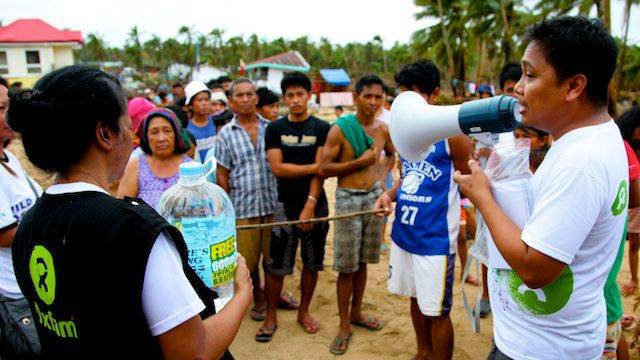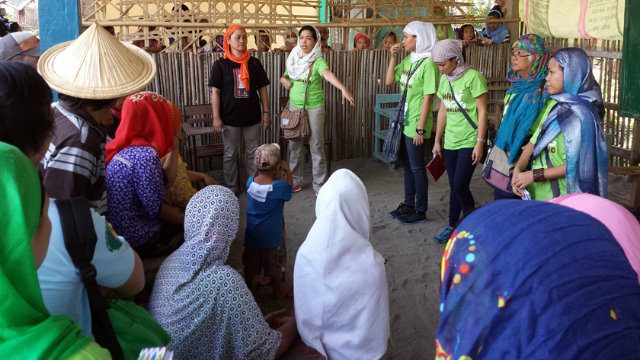SUMMARY
This is AI generated summarization, which may have errors. For context, always refer to the full article.

“Simula pa noong maliit ako, kami ay hinubog sa saka,” recalls Gary Castañares. (Since I was small, I was brought up to be a farmer.)
A 39-year-old farmer from Sultan Kudarat, he once thought that farming was a dead end; and that due to falling profits and the rising costs of chemical fertilizers and pesticides, it would not be enough to support his four growing children.
“Akala ko, wala na’ng ibang paraan, titigil na nga ako sa pagsasaka,” said Castañares. (I thought that there was no other way, I would have to stop farming.)
Gary noticed that not only was his harvest on his two-hectare farm decreasing, his farm had more pests, despite all his hard work.
He found hope, however, when Community Organizers Multiversity (COM) started to carry out an agriculture climate adaptation program in his village, with support from Oxfam.
Gary and other farmers joined the program where, over a three-month period, they learned about the impacts of climate change and new farming practices such as the use of fish culture and the planting of Palauan – a plant that can withstand severe weather changes. They cultivated new crops and practiced techniques on a communal field, giving them the chance to experiment with minimal risk.
Today, not only can he provide for his family, Gary now also helps teach his fellow farmers how to maximize their crop yields using organic farming techniques.
“Excited po ako sa organic farming dahil sa nakikita kong mababawasan na po yung gastos namin sa mga chemical na fertilizer,” explained Gary. (I am excited with organic farming because I see how it reduces our costs from using chemical fertilizer.)
Now, Gary uses vermicast as organic fertilizer and 20 kilos of rice seeds for his half a hectare. In the past, he needed one sack of rice seeds using chemical fertilizer.
Gary saw how reducing costs meant greater profit, and he also had the added benefit of knowing that his products were safe and chemical-free.
“‘Pag nag-promote tayo ng organic farming, nakakatulong din tayo sa ating environment dahil wala po tayong gagamiting chemicals po.” (When we promote organic farming, we help our environment because we don’t use chemicals.)
Exploring new opportunities
In Salcedo, Eastern Samar, Efipanio Pagad, a 51-year-old fisherman affectionately known as “Mang Panyong”, lost all the tools of his trade when Typhoon Yolanda struck in November 2013 – including his fishing nets, boat, and paddle.
With the help of Oxfam’s cash-for-asset-recovery program, he was able to rebuild his house and support his family. Mang Panyong and other fisherfolk were paid a living wage in exchange for clearing debris from critical mangrove areas.
They were later trained how to plant mangroves, properly collect propagules and wildlings, as well as how to nurture them and monitor their survival.
“We’re excited to start the mangrove nursery. We can grow our own seedlings and sell it. We will build the nursery with native materials. We will be paid for the work also. That’s additional income to our family for now,” said Mang Panyong.
Poverty and risk
The plight of Gary and other farmers in Sultan Kudarat, as well as of Mang Panyong and other fisherfolk in Samar, are no different from Filipinos all over the country who live in poverty and face daily hazards.
The Philippines faces huge development challenges, such as high inequality and pockets of fragility that threaten its stability and development. Despite a growing economy, around 16% of the population or 17 million people live below the poverty line. The Philippines is also one of the top 3 disaster prone countries in the world, according to the 2014 World Risk Report.

Oxfam is an international confederation of 17 organizations working in over 90 countries across the globe to find solutions to poverty and injustice. Oxfam’s work in the Philippines, which started after the People Power revolution, focuses on supporting women, saving lives, and building livelihoods. It is active in disaster-hit and conflict-prone areas, particularly in Eastern Visayas and Mindanao.
“Oxfam’s goal in the Philippines is to help address poverty in the country by reducing the levels of inequality and building a more resilient society,” said Justin Morgan, Country Director of Oxfam in the Philippines.
This can be done, Morgan said, by empowering women and other vulnerable groups, by ensuring accountability, and by partnering with civil society, government, and business in building resilient livelihoods.
Oxfam believes a just world without poverty is possible if individuals, communities and institutions, work together and do their fair share.
Empowering the poor
Oxfam’s programs, in partnership with local civil society organizations, also educate and empower poor women.
Zahria Muti-Mapandi is a Maranao woman and the head of a Muslim women’s organization in Mindanao. Oxfam helped nurture her advocacy for development plans and gender-based budgeting at the local government level.
“We are hoping that by making the government and women talk and design programs for gender mainstreaming…(women’s voices) are not only heard, but their experiences of inequality will change into experiences of empowerment,” said Muti-Mapandi. 
In Mindanao, Oxfam’s sustainable livelihood program over the last five years helped local residents address issues such as women’s access to markets, access to credit, addressing impacts of climate change, and develop smallholders’ business enterprises on organic rice, rubber, abaca, and moringa.
Oxfam also initiated climate change adaptation and risk reduction measures in its rural agricultural communities. Oxfam is well known for its advocacy to call for an increase in public and private sector investments on climate adaptation.
Oxfam also focuses on empowering women to become economic leaders. It has pushed for care work, largely borne by women, to be supported by government programs and shared more equally with men in the household.
“We will work with a wide range of partners and focus our efforts to help communities in Eastern Visayas and conflict-affected areas in Mindanao,” said Morgan.
Spreading hope
Oxfam has helped capacitate Gary and his community, enabling them to produce healthier crops with greater confidence in their own farming abilities.
(My wish for them, is that they see the opportunity and that they also get excited because if they don’t see the opportunity, I’ll say that the technology is wasted. And that they also adhere to organic farming, because of what I see is a great help from our problems.)
It is Gary’s aspiration that more programs like Oxfam’s will help foster a new generation of resilient and more productive farmers.
By working together with communities to uplift lives and livelihoods, Oxfam is helping create a just world without poverty, one person and one community at a time. – Rappler.com
Do you believe that a just world without poverty is possible? Tell us in the comments section below.
Learn more about Oxfam in the Philippines and follow the Oxfam in the Philippines Facebook page today.
Add a comment
How does this make you feel?
There are no comments yet. Add your comment to start the conversation.